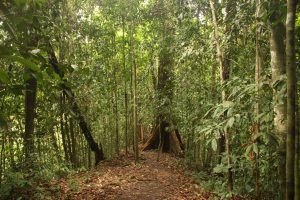The 10 nations of the Association of Southeast Asian Nations (ASEAN) are being urged to adopt stronger measures to enshrine a healthy environment as a human right – and improve the legal recourse for victims deprived of their rights.
In a recent report, “Prosperous and Green in the Anthropocene: The human right to a healthy environment in Southeast Asia,” 13 lawyers and policy researchers provided an overview of legal frameworks and options ahead of the United Nations Biodiversity Summit in Kunming next year.
Published last week by the Raoul Wallenberg Institute of Human Rights and Humanitarian Law, the report argues that ASEAN already recognizes the right “to a safe, clean, and sustainable environment” in its 2012 Human Rights Declaration. This principle is also present in various nations’ legal systems
Elements include the right to clean air, a safe climate, clean water and adequate sanitation, access to healthy and sustainably produced food, a non-toxic environment, and healthy ecosystems.
But ASEAN does not have a dedicated treaty or legal instrument to support those rights and what is needed now, the authors say, is to strengthen implementation and encourage enforcement.
The report also notes that Southeast Asian countries ranked among the worst in the world for forest and mangrove loss, extinction of plant and animal species, climate-related disasters, household air pollution, and smoke from forest fires.
This is evident each year when about 200 million people across large swathes of Southeast Asia are forced to choke on smog caused by massive burning off in Indonesia. Similar pollution also plagues large parts of mainland Southeast Asian during the annual dry season.
Each year brings promises by politicians that the issue will be dealt with, but the haze has routinely returned since 1972 and rarely are those responsible brought to account.
Health questions aside, damages caused by the 1997 haze, perhaps the worst, was conservatively put at $4.47 billion. In 2015, when fires cut across 2.6 million hectares, damages cost Indonesia $15.7 billion – twice the costs of reconstruction following the 2004 tsunami.
Flights are often cancelled and people told to stay indoors amid a sharp increase in asthma attacks, prompting Indonesia to open temporary clinics and “oxygen houses.”
One study by Verdinand Robertua from the Christian University of Indonesia found that annual forest fires contribute 60 percent of Indonesia’s total greenhouse gas emissions. Indonesia is the world’s third biggest emitter after China and the United States.
“Several Southeast Asian countries, to their credit, have taken important steps in recognizing the right to a healthy environment,” lead author and lawyer Claudia Ituarte-Lima said.
They are Thailand, the Philippines, Indonesia, and Vietnam.
“However, progress made by governments lawmakers and courts is not always well-recognized or published internationally.”
The authors say recognizing the right to a healthy environment is not a silver bullet as there are no direct, legal routes from treaty to prosecution.
But where international norms, such as the right to a healthy environment, are recognized in national legal systems and policies, it is more likely that citizens could bring successful cases to prosecution, they argue.
ASEAN’s options, they said, include the adoption of a regional instrument similar to the Escazu agreement used by Latin America and Caribbean countries, or to become a party to the Aarhus Convention, a European agreement that is now open to non-European Member States.
Other avenues include strengthening and expanding the mandate of the ASEAN Intergovernmental Commission on Human Rights (AICHR), enabling it to promote compliance and conduct reviews.
And continued support for specialized environmental courts, national human rights institutions and the integration of human rights into multilateral environmental agreements like the post-2020 global biodiversity framework, currently under negotiation.
“The current race to meet the challenges of the COVID world requires deep, systemic change to make healthy environments a reality for everyone,” said Ituarte-Lima. “Recognizing the right to a healthy environment highlights what is at stake – and ensures no one gets left behind in this race.”
Luke Hunt can be followed on Twitter @lukeanthonyhunt

































